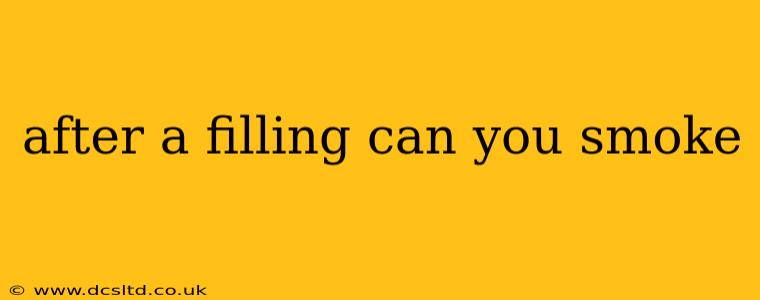After a Filling, Can You Smoke? The Definitive Answer
The short answer is a resounding no. Smoking after a dental filling is strongly discouraged, and here's why. The act of smoking significantly increases your risk of complications and jeopardizes the success of your dental work. Let's delve into the details.
Why Smoking After a Filling is a Bad Idea
Smoking introduces numerous harmful elements into your mouth, creating an environment far from ideal for healing. Here are the key reasons why you should abstain from smoking after a filling:
-
Impeded Healing: The suction created by smoking can dislodge the filling material, especially in the crucial initial hours and days after placement. This can lead to premature failure, requiring costly and inconvenient repairs. The heat from the cigarette can also negatively affect the bonding process of the filling material, weakening its adhesion to the tooth.
-
Increased Infection Risk: The smoke itself contains irritants that can inflame the gums and the area surrounding the newly placed filling. This increased inflammation creates a breeding ground for bacteria, raising the risk of infection and potentially leading to complications like abscesses.
-
Delayed Healing: Smoking reduces blood flow throughout the body, including the mouth. This compromised blood supply hinders the natural healing process, slowing down the recovery of the tooth and surrounding tissues. This can prolong discomfort and increase the chance of complications.
-
Taste and Smell Alterations: Smoking can mask the subtle signs of a problem developing. You may not notice a developing infection or the loosening of your filling as quickly, leading to a delay in necessary treatment.
How Long Should You Wait Before Smoking After a Filling?
There's no magic number of hours or days. The best approach is to avoid smoking entirely after a filling, ideally for as long as possible. Even if the initial healing seems complete, the continued risk of complications remains.
What Are the Risks of Smoking After a Dental Procedure in General?
The risks extend beyond fillings. Smoking after any dental procedure, including extractions, root canals, or implants, significantly increases the risk of complications. It delays healing, compromises the success of the procedure, and dramatically raises the risk of infection.
What if I Can't Quit Smoking?
We understand that quitting smoking can be a challenging process. If you're struggling, please reach out to your dentist and seek support from resources dedicated to helping smokers quit. Your oral health, and your overall health, are worth it.
Alternatives to Smoking
Nicotine replacement therapy (NRT) such as patches, gum, or lozenges can help manage cravings while you work on quitting. Talking to your doctor or a smoking cessation specialist can provide personalized support and strategies.
In conclusion, avoiding smoking after a dental filling is crucial for ensuring a successful outcome and promoting optimal oral health. Your dentist's advice is paramount; always follow their post-procedure instructions to maximize the longevity and effectiveness of your dental work.
